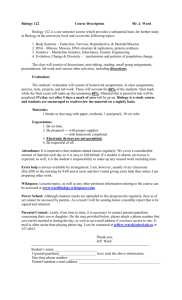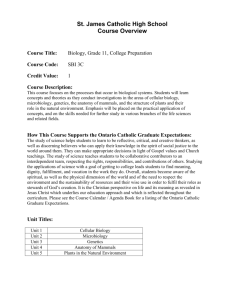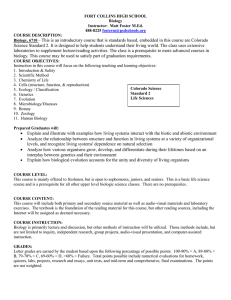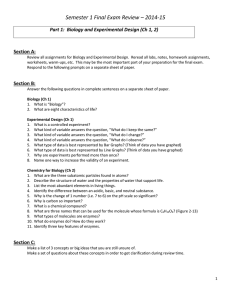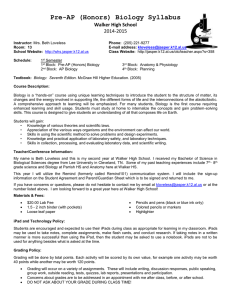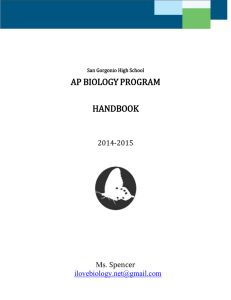Master Course Syllabus - Passaic County Community College
advertisement
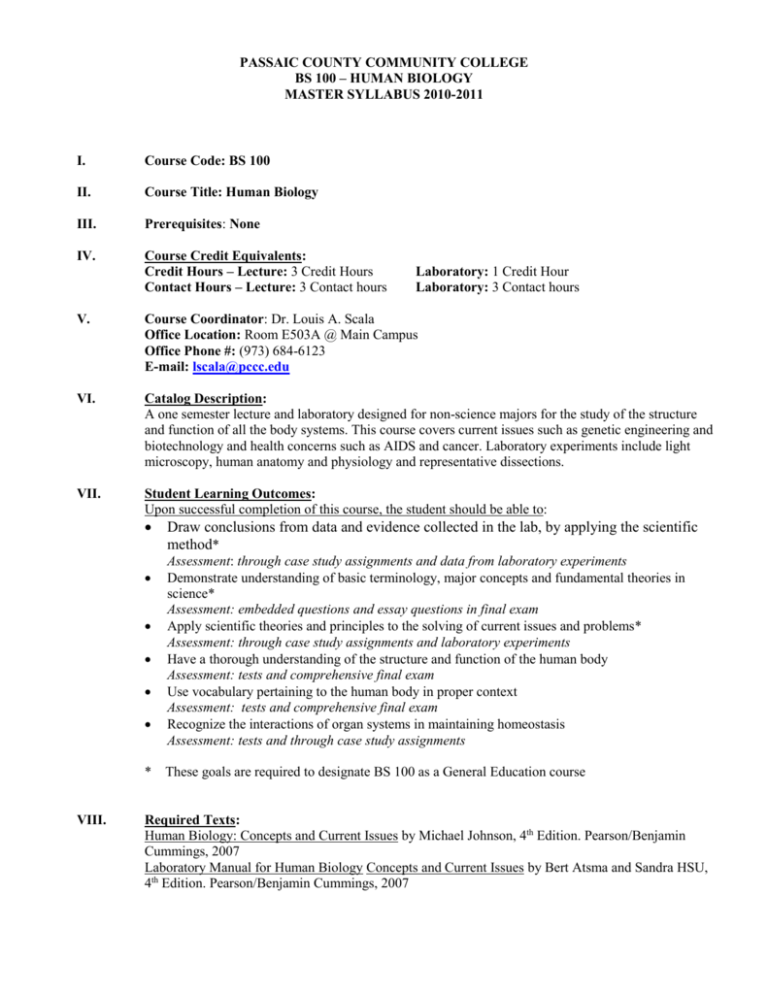
PASSAIC COUNTY COMMUNITY COLLEGE BS 100 – HUMAN BIOLOGY MASTER SYLLABUS 2010-2011 I. Course Code: BS 100 II. Course Title: Human Biology III. Prerequisites: None IV. Course Credit Equivalents: Credit Hours – Lecture: 3 Credit Hours Contact Hours – Lecture: 3 Contact hours Laboratory: 1 Credit Hour Laboratory: 3 Contact hours V. Course Coordinator: Dr. Louis A. Scala Office Location: Room E503A @ Main Campus Office Phone #: (973) 684-6123 E-mail: lscala@pccc.edu VI. Catalog Description: A one semester lecture and laboratory designed for non-science majors for the study of the structure and function of all the body systems. This course covers current issues such as genetic engineering and biotechnology and health concerns such as AIDS and cancer. Laboratory experiments include light microscopy, human anatomy and physiology and representative dissections. VII. Student Learning Outcomes: Upon successful completion of this course, the student should be able to: * VIII. Draw conclusions from data and evidence collected in the lab, by applying the scientific method* Assessment: through case study assignments and data from laboratory experiments Demonstrate understanding of basic terminology, major concepts and fundamental theories in science* Assessment: embedded questions and essay questions in final exam Apply scientific theories and principles to the solving of current issues and problems* Assessment: through case study assignments and laboratory experiments Have a thorough understanding of the structure and function of the human body Assessment: tests and comprehensive final exam Use vocabulary pertaining to the human body in proper context Assessment: tests and comprehensive final exam Recognize the interactions of organ systems in maintaining homeostasis Assessment: tests and through case study assignments These goals are required to designate BS 100 as a General Education course Required Texts: Human Biology: Concepts and Current Issues by Michael Johnson, 4th Edition. Pearson/Benjamin Cummings, 2007 Laboratory Manual for Human Biology Concepts and Current Issues by Bert Atsma and Sandra HSU, 4th Edition. Pearson/Benjamin Cummings, 2007 IX. Methods of Evaluation: Grade Scale Above 92 % 90 to 92 % 87 to 89 % 83 to 86 % 80 to 82 % X. XI. A AB+ B B- 77 to 79 % 70 to 76 % 60 to 69 % Below 60 % C+ C D F Additional Course Information: a) Attendance: Attendance will be taken for every class. Students are expected to attend all lectures and lab sessions. Punctuality is required. b) Eating/Drinking: Is not allowed in class c) Cell Phones: Turn off your cell phones or do not bring them to class. Absolutely no cell phone usage while class is in session. d) Children: will not be permitted in lecture or lab sessions for any reason. e) Cheating: Any student caught cheating during a test will get an automatic zero and may be dismissed from the course with an ‘F’ f) Homework/Assignments: When assignments are given, the due dates will be assigned. Students are expected to follow the deadlines. No late work will be accepted g) The laboratory is worth 33% of your final grade. It is required that you pass the lab with a 70% or better in order to pass the course. You CANNOT pass the course with a failing lab grade. Disabilities: If you have a disability and believe that you need accommodations in my classroom, please see your counselor in the Counseling Department. If you require testing accommodations, you must inform me one week in advance of the test. IX. General Course Outline: Semester Reading Assignment Week Chapter # 1 1 2, 3 2 4 3 5 4 6 5 6 6 7 7 8 8 9 9 14 10 10 11 15 12 12 13 13 17, 18 14 24 15 16 Week (Lab #) 1 2 3 4 5 6 7 8 9 10 11 12 13 14 15 Lab Manual Assignment Exercise 1 Exercise 2 Exercise 3, 4 Exercise 5 Exercise 6 Exercise 8 Exercise 9 Exercise 14 Exercise 15 Exercise 17 Exercise 16 Exercise 10 Exercise 11 Exercise 12 Lecture Topics Covered Characteristics of Life Biomolecules, Cells & How they Work Tissues, Organs, Organ Systems Bone Tissue & Skeletal System Muscular System Muscular System, continued Blood & Blood Typing Circulatory System Immune & Lymphatic Systems Digestive System Respiratory System Urinary System Nervous System Sensory Mechanisms Cell Reproduction and Cancer Human Impacts, Biodiversity & Environment Comprehensive Final Exam Laboratory Topics Scientific Method & Laboratory Protocol The Microscope The Anatomy & Physiology of Cells Tissues Orientations to the Human Body The Skeletal System The Muscular System Laboratory Midterm The Cardiovascular System I: Blood The Cardiovascular System II: Heart & Blood Vessels The Digestive System & Nutrition Human Respiration The Nervous System I The Nervous System II Structure/Function of Sense Organs Laboratory Final

